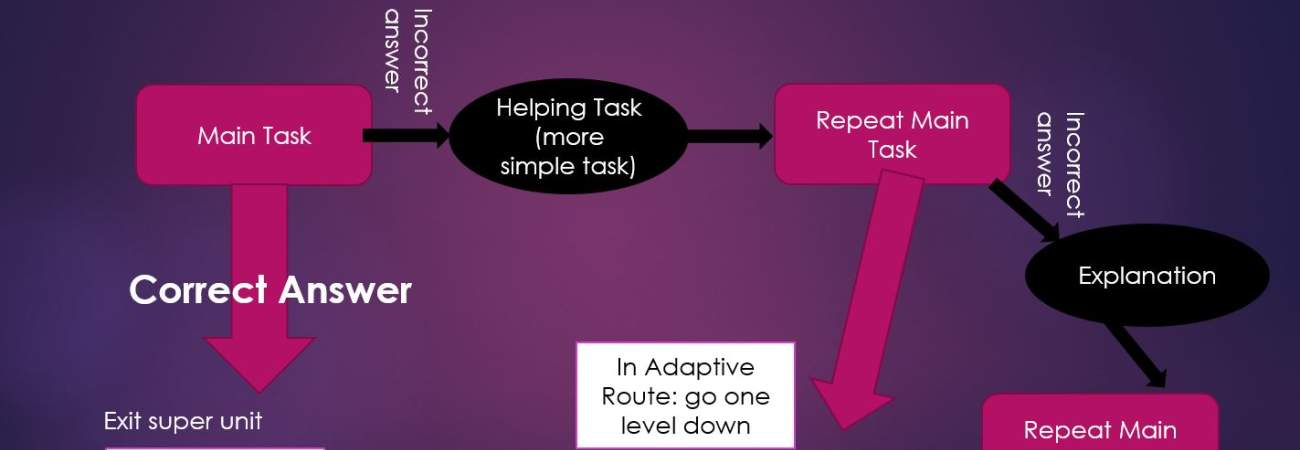
Within the framework of the EduBot strategic partnership Erasmus+ project, we are working on deploying an AI assistant alongside educators, providing individual learning experiences to guide each student through digital learning materials. The AI assistant adapts flexibly to the student's knowledge level and learning habits, utilizing data from the learning process to support teachers in organizing differentiated education.
The curriculum primarily prepares students for the exam after 8th grade, and teachers assist in the development in every country. Alongside curriculum development, the project also focuses on devising a methodology that can be applied to any subject or curriculum, leveraging the knowledge gained from the learning process data.
The uniqueness of the curriculum lies in its division into difficulty levels within each topic, built upon entrance-level tasks. Each task is linked to necessary knowledge elements, supportive tasks, and explanations, creating an adaptive learning path allowing students to progress at their own pace. The EDUBOT AI assistant aids by advancing students who solve tasks correctly to higher levels until they encounter challenges. In such cases, the assistant provides brief explanations and easier tasks to guide the student. If challenges persist, the student receives explanations and continues preparation at a lower level.
All of this operates within an e-learning support system accessible on computers, tablets, and smartphones. Students can use the application individually, progressing through tasks aided by supportive exercises. If they face challenges, they have several options: supportive questions, explanations/definitions, asking a teacher, or exiting - users can choose from these. The assistant always suggests possible next steps, but students can override these and request different assistance.
The digital content is developed by educators in all four partner countries, focusing on preparing students for the exam after the 8th grade. The curriculum follows linear and adaptive pathways. Linear paths are straightforward; students start at the beginning and progress to the end.
In adaptive paths, the learning route 'adapts' to the student's personal needs, changing based on the student's actions (correct or incorrect answers to certain tasks).
Adaptive paths can be customized based on the learning path owner's decisions. By default, if a student solves a task correctly on the first attempt, they move up one level (skipping all further tasks and materials at that level). If not, they move down one level, even if they solved the task with the help of supportive questions and explanations.
Adaptive paths are excellent for refreshing existing knowledge, identifying and addressing skill gaps, preparing for exams, supporting the progress of students with fewer opportunities, or any other form of differentiated teaching.
You can view an adaptive sample curriculum here (Guest access is available, or registration is possible. The EDUBOT Assistant is currently replaced by control panels).
In the planned system, an artificial intelligence assistant will guide the student. The AI assistant decides which task to offer the student after completing a task. The decision takes into account the completed tasks' results, the student's learning data, and other students' learning experiences, making the adaptive paths flexible.
A crucial aspect of the methodology is that the assistant does not attempt to replace the teacher but supports their work. It monitors student activities and regularly organizes students into clusters based on their position within the curriculum and challenges they face. This allows educators to differentially handle student clusters with similar challenges.
The development of the curriculum is followed by pilot teaching among students.
The beta version of the system is already available. After registration, it can be used here (currently without AI assistant support)
The partners in the EduBot project are the Interregió Fórum Egyesület in Hungary, the ADN Instytut in Poland, Harghita County Council and RegioNet in Romania, and Tandem n.o. in Slovakia. The project started in 2022 and will conclude in 2024.
Download link: https://drive.google.com/file/d/1Xa0j1gbbvTpWcp8OBoO4h1v3amUh43Ka/view?usp=sharing